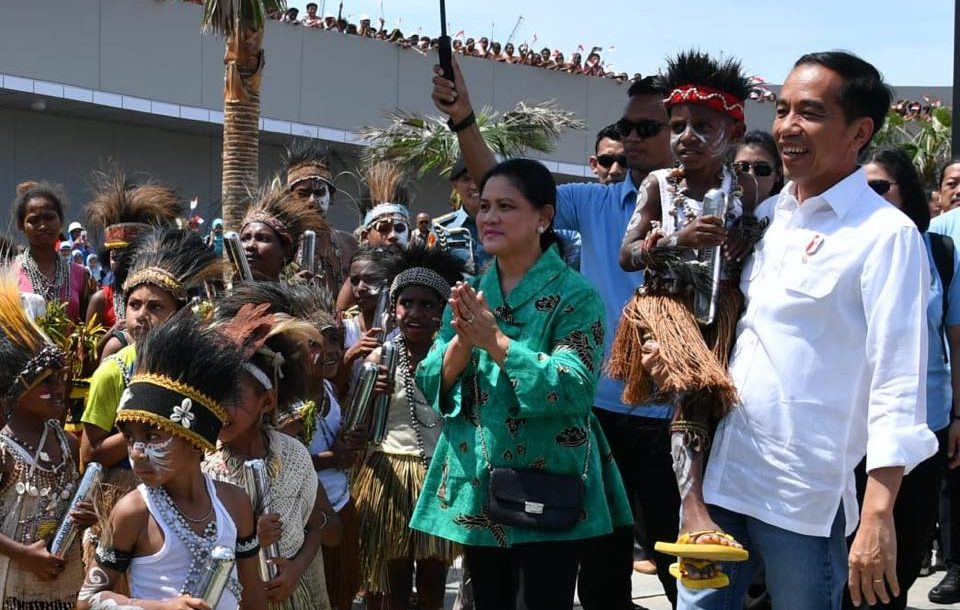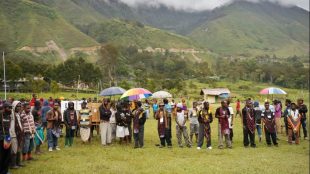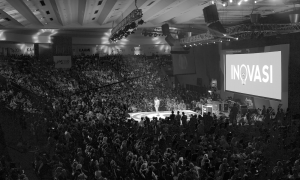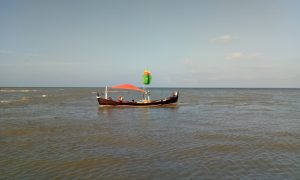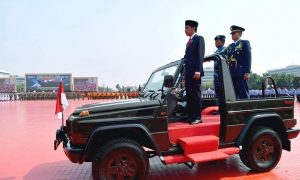The prospect of Indonesians abstaining from voting (golput), out of disillusionment with Jokowi or weariness of the options on offer, has been a widely-debated topic in this election. Nowhere is this more relevant than in the Papuan provinces, where disappointment with President Joko Widodo (Jokowi)’s failure to address human rights abuses is felt most acutely. Some independence activists are encouraging Papuans not to vote because elections are “a tool for the colonial government to put local power holders in place to safeguard their interests”. Should the government be worried about Papuans not turning out to vote?
Despite his inability to address human rights issues in Papua, Jokowi still remains quite popular here. Voter turnout may be lower than in 2014, but the government can still count on a good electoral result in both Papua and West Papua provinces, because of voters’ acknowledgement that Jokowi has done a reasonable job of delivering development programs in the region, or out of hope (or desperation) that he might just try a bit harder to address the bigger political issues facing Papua in his second term. At the same time, an important complicating factor is the unique noken bloc voting system used in some parts of Papua, which has empowered tribal leaders, and not voters, to decide who to vote for—or indeed whether to vote at all.
Jokowi’s first term in Papua
None of Indonesia’s democratically-elected presidents have paid as much attention to Papua as Jokowi. Indeed, by the time he took office in October 2014 Jokowi has visited Papua nine times—more than any previous president—to inspect and promote the development projects he has initiated here. Jokowi has commenced several programs in the first term of his presidency, such as building Pasar Mama-Mama Papua (a traditional market) and the Holtekamp Bridge in Jayapura, as well as inaugurating infrastructure projects in Manokwari, electricity projects in Papua and West Papua, the Time Capsule in Merauke, and so forth. He also reviewed the progress of fibre optic network projects, sports facilities for the PON 2020 (National Sports Week) in Jayapura and famously rode his own trial bike to explore the Trans Papua Road segment on Lake Habema, Jayawijaya.
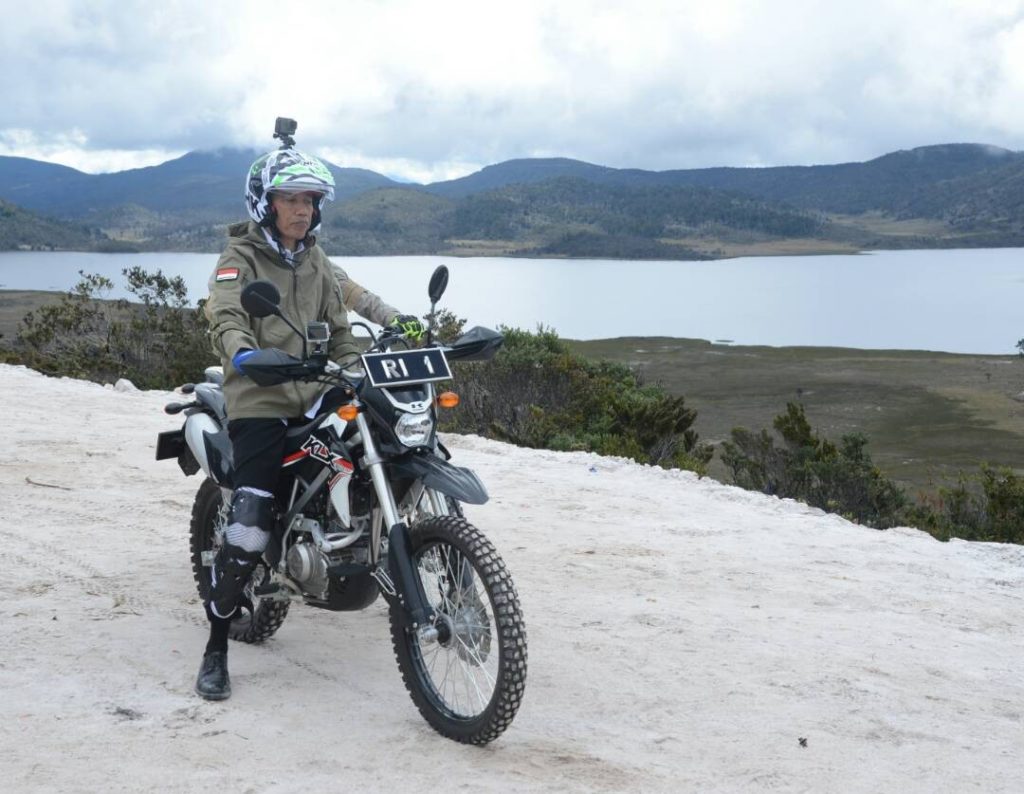
Jokowi inspecting the Trans-Papua road project in Wamena, May 2018. (Photo: State Palace)
But development programs offered by Jokowi do not mean he has won the heart of all Papuans. His focus on development projects has also been criticised by Indonesian analysts like Adriana Elisabeth from LIPI, who observed that an incident like the attack in Nduga (the Trans Papua Road), attributed to OPM, raises the question of why such development cannot stop the violence. Natalius Pigai, from KOMNAS HAM, has also criticised Jokowi’s visits as counting for nothing; and conversely, Jokowi’s presence has been a source of the problem in Papua because he lacked the social competence to build trust, defence and security management functions.
Jokowi’s way of dealing with the human rights violations in Papua is unsatisfactory, and everyone knows it. The Human Rights Watch World Report 2017 observed that even though Jokowi’s government had announced it would seek accountability for 11 high-priority past human rights cases in Papua—including the Biak massacre in July 1998 and the military crackdown on Papuans in Wasior in 2001 and Wamena in 2003—there were no details provided by the government as to when, where, and how the cases would be addressed.
In a nutshell, Jokowi has demonstrated his incapability of dealing with human rights issues in Papua. The conflict resolution that the government hoped to achieve has never taken place, and the Jokowi government’s policies have not lessened the desire for independence that is still alive in many parts of Papua. Thus, Papuans are happy with Jokowi’s overall development programs, but are distrustful of him with regard to his unfulfilled promises around human rights issues. What will they do on election day?
Likely outcomes
First of all, Jokowi is fortunate that his opponent is Prabowo. Many Papuans are concerned that Prabowo, a former military general, will rule the country like his former patron and father-in-law, President Soeharto, who limited political freedoms and increased the role of the military in Papua. Prabowo is also perceived as having a bad track record in Papua, where he faces allegations of responsibility for the deaths of eight civilians and burning of villages in the aftermath of the Mapenduma hostage rescue operation he led in 1996. Many Papuans will vote for Jokowi just to make sure Prabowo does not become president.
How Papua voted
In Papua, pseudo-traditional voting practices are a pretext for blatant violations of electoral integrity.
Third, voters in Papua who will participate in Piplres 2019 comprise indigenous Papuans and non-indigenous people. Indigenous Papuans (or Orang Asli Papua/OAP) are those ethnically Melanesian people belonging to Papuan tribes (or those who are recognised by indigenous Papuan community as indigenous people—the process for deciding who is and isn’t an “indigenous” Papuan remains controversial). Non-indigenous people, often called ”Amber”, are those who are not Melanesian but live in Papua.
The concerns of ethnic Papuans are a focus of much discussion about how Papua will vote, but the non-indigenous populations in Papua should not be overlooked either. Their number is growing significantly every year, and many of them like Jokowi, too. Moreover, few of these non-indigenous people in Papua care about human rights abuses, with demonstrations over human rights issues typically dominated by indigenous people.
Which leaves us with the question of golput (non-voting) in Papua, a possibility which I believe has been overstated. First, the presidential election and the legislative election are occurring concurrently this year. Party support is important, and many Papuan candidates are running for parliamentary seats from various parties. These candidates will look to mobilise voters to vote for their local family, community or patronage networks. Once they in the polling booth (even if predominantly to vote for local legislative candidates), it’s likely people will also make a choice to vote for the president.
Second, despite appeals from some Papuan activists to golput, the two most powerful organisations in the region: the Papuan People’s Assembly (MRP) and Papuan Representatives Council (DPR Papua) have not encouraged Papuans not to vote, and neither have them organised a boycott for this 2019 election.
Yet some Papuans will not be able to choose for themselves whether to vote or whether to boycott. In some regions in Papua, the so-called Noken system is used as substitute for the ballot box. The tribal chief represents all the voice of the tribal members, ostensibly done after achieving a consensus in the community. Voter ballots are inserted into the Noken, a traditional woven bag. Essentially, the tribal chief votes on behalf of the tribal members, skewing the idea of what constitutes voter turn-out.
The Noken system has been found to be constitutional by Indonesia’s Constitutional Court, which considered it a valid concession to Papuan culture. Yet, some Papuans point out that the practice is unfair and may encourage others to golput. Otis Ernest Tabuni, a college student from Nduga, argues that “the Noken system did not demonstrate the real practice of democracy and it has killed the right of a person to vote”.
Even in the case that some tribal chiefs tell their citizens to golput, the noken system is only employed in a minority of areas in the two Papuan provinces in the 2019 election, specifically in 12 regencies, and mostly only for those living in the mountain areas. For context: in Papua Province there are 28 regencies and 1 city, while West Papua Province has 12 regencies and 1 city.
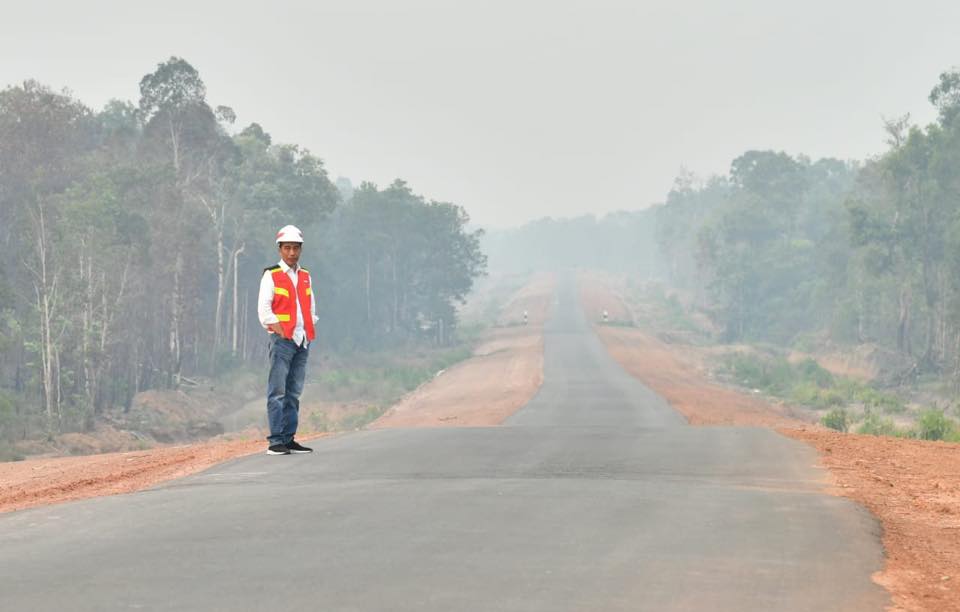
Jokowi inspecting a road project near Merauke, November 2018. (Photo: Kemensetneg on Facebook)
Expectation from Papuans beyond the election
Just like in other regions, people in Papua will definitely want the 2019 elections to be fair, transparent, and peaceful. We all hope there no conflict, demonstration, or data manipulation takes place in Papua.
In Jakarta, Jokowi and his government might see his re-election, and other strong electoral results in Papua, as a sign his government has done a good job in the region. But Papuans still badly want him to resolve human rights cases in Papua. This issue remains crucial to the president’s affirming his commitment to addressing human rights concerns and aiding the healing process for victims and their families, as well as for implementing the ten human rights conventions Indonesia has ratified. Just because Papuans acknowledge that Jokowi has paid attention to development issues in Papua does not mean people forget the human rights issues here.
Jokowi needs to find a way forward to establish peace in Papua. After the East Timor and Aceh conflicts, Papua remains the case that is still unresolved by the Indonesian government. While the East Timorese participated in a referendum and the Acehnese engaged in a dialogue, the people of Papua have had no such opportunity for the further resolution of endemic political problems. If peace can be made in Papua, then Jokowi’s future development projects will run more smoothly and be endorsed by all Papuans.
 Facebook
Facebook  Twitter
Twitter  Soundcloud
Soundcloud  Youtube
Youtube  Rss
Rss 